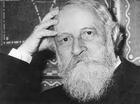
Martin Buber (Vienna, February 8, 1878 - Jerusalem, June 13, 1965) was an Austrian-Israeli Jewish philosopher and writer. Recognized for his philosophy of dialogue and his mystical writings in the Hasidic line, it can be concluded that his vision of philosophy is existentialist with anarchist overtones. Buber was part of the supporters for the dialogue between Jews and Arabs in Palestine after his installation in Jerusalem in 1938.
Buber proposes to put man and his relationships back at the center of thought. The study of the anguish of his existence is at the core of his philosophy and of the interwar period of the 20th century, in the vein of his friend Lev Shestov, with whom he maintained a relationship of friendship and mutual admiration. . To recognize the commitment towards the other is to recognize the human himself, it is the dialogue that Buber proposes, because without the other man cannot be realized. The man should put aside his narcissism and embrace the other to create a community through a new language that is discovered in the you-me relationship.




